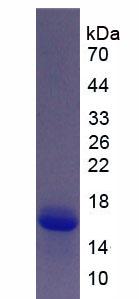Active S100 Calcium Binding Protein A6 (S100A6)
S100-A6; 2A9; 5B10; CABP; CACY; PRA; MLN 4; Calcyclin; Growth factor-inducible protein 2A9; Prolactin receptor-associated protein
- Product No.APB769Hu01
- Organism SpeciesHomo sapiens (Human) Same name, Different species.
- Buffer FormulationPBS, pH7.4, containing 0.01% SKL, 5% Trehalose.
- Traits Freeze-dried powder
- Purity> 95%
- Isoelectric Point5.7
- ApplicationsCell culture; Activity Assays.
- DownloadInstruction Manual
- UOM 10µg50µg 200µg 1mg 5mg
- FOB
US$ 320
US$ 800
US$ 1600
US$ 4800
US$ 12000
For more details, please contact local distributors!
ACTIVITY TEST

S100A6 is a calcium-binding protein, which functions as calcium sensor and modulator, contributing to cellular calcium signaling. It is reported that S100B and S100A6 differentially modulate cell survival by Interacting with distinct RAGE (Receptor for Advanced Glycation End Products). Thus a binding ELISA assay was conducted to detect the interaction of S100A6 and RAGE. Briefly, recombinant human S100A6 were diluted serially in PBS, with 0.01%BSA (pH 7.4). Duplicate samples of 100uL were then transferred to RAGE-coated microtiter wells and incubated for 2h at 37°C. Wells were washed with PBST and incubated for 1h with anti-S100A6 mAb, then aspirated and washed 3 times. After incubation with HRP labelled secondary antibody, wells were aspirated and washed 3 times. With the addition of substrate solution, wells were incubated 15-25 minutes at 37°C. Finally, add 50µL stop solution to the wells and read at 450nm immediately. The binding activity of of S100A6 and RAGE was shown in Figure 1, and this effect was in a dose dependent manner.
USAGE
Reconstitute in 10mM PBS (pH7.4) to a concentration of 0.1-1.0 mg/mL. Do not vortex.
STORAGE
Avoid repeated freeze/thaw cycles. Store at 2-8°C for one month. Aliquot and store at -80°C for 12 months.
STABILITY
The thermal stability is described by the loss rate. The loss rate was determined by accelerated thermal degradation test, that is, incubate the protein at 37°C for 48h, and no obvious degradation and precipitation were observed. The loss rate is less than 5% within the expiration date under appropriate storage condition.
GIVEAWAYS
INCREMENT SERVICES
-
 BCA Protein Quantification Kit
BCA Protein Quantification Kit
-
 Molecular Mass Marker for Protein
Molecular Mass Marker for Protein
-
 Monoclonal Antibody Customized Service
Monoclonal Antibody Customized Service
-
 Polyclonal Antibody Customized Service
Polyclonal Antibody Customized Service
-
 Protein Activity Test Experiment Service
Protein Activity Test Experiment Service
-
 Electrophoretic Mobility Shift Assay (EMSA) Experiment Service
Electrophoretic Mobility Shift Assay (EMSA) Experiment Service
-
 Buffer
Buffer
-
 Lentivirus Packaging Experiment Service
Lentivirus Packaging Experiment Service
-
 Adenovirus Packaging Experiment Service
Adenovirus Packaging Experiment Service
-
 Real Time PCR Experimental Service
Real Time PCR Experimental Service
-
 Spike RBD Protein (S-RBD)
Spike RBD Protein (S-RBD)
-
 Protein G
Protein G
-
 Protein A
Protein A
| Magazine | Citations |
| Journal of Proteomics | Tear proteome and protein network analyses reveal a novel pentamarker panel for tear film characterization in dry eye and meibomian gland dysfunction PubMed: 23201116 |
| Tumour Biol | Diagnostic significance of S100A2 and S100A6 levels in sera of patients with non-small cell lung cancer PubMed: 26361956 |
| Clinical and Translational Medicine | Serum levels of S100A6 are unaltered in patients with resectable cholangiocarcinoma pubmed:27709523 |
| Gastroenterology | Tu1938-Micronutrients Assessment in Patients with Cirrhosis 10.1016:S0016-5085(18)33544-3 |
| Gastroenterology | Tu1942-PI3K/AKT-Mediated Upregulation of C7 Inhibits Colorectal Cancer Proliferation and Metastasis 10.1016:S0016-5085(18)33544-5 |
| Tumor Biology | Proteomics detection of S100A6 in tumor tissue interstitial fluid and evaluation of its potential as a biomarker of cholangiocarcinoma Pubmed:29629840 |
| scandinavian journal of clinical & laboratory investigation | Serum S100A6, S100A8, S100A9 and S100A11 proteins in colorectal neoplasia: results of a single centre prospective study Pubmed: 31856598 |
| CELL BIOCHEMISTRY AND FUNCTION | S100A6 represses Calu©\6 lung cancer cells growth via inhibiting cell proliferation, migration, invasion and enhancing apoptosis 34008212 |
| MOLECULAR VISION | Quantification of a panel for dry-eye protein biomarkers in tears: A comparative pilot study using standard ELISA and customized microarrays 34012227 |









